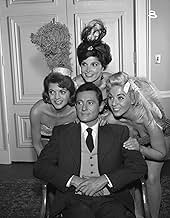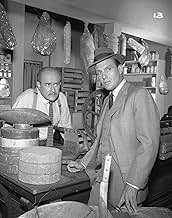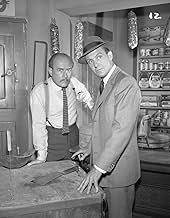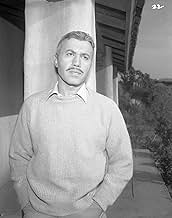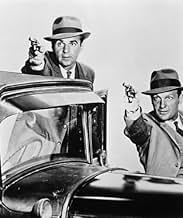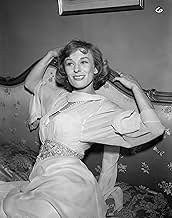El agente especial Eliot Ness y su equipo de élite de agentes luchan contra el crimen organizado en la década de 1930 en Chicago.El agente especial Eliot Ness y su equipo de élite de agentes luchan contra el crimen organizado en la década de 1930 en Chicago.El agente especial Eliot Ness y su equipo de élite de agentes luchan contra el crimen organizado en la década de 1930 en Chicago.
- Ganó 2 premios Primetime Emmy
- 4 premios y 7 nominaciones en total
Explorar episodios
Reseñas destacadas
I must differ only slightly from the praise of one who precedes me, but yes, it was a cracking good show! When a local station ran the series in syndication at midnight in 1967, I turned into an insomniac.
Part of it was my youth; part was/is the b&w presentation giving it a brooding, "gritty" (pardon the cliche) flavour; part was the musical score. Frankly, I found it much superior to the colour and more mature (?) series recently under the same title. Possibly the early '60s series had the elements of a morality play that move some part of me that the more ambiguous -- and in places historically accurate -- new UNTOUCHABLES can not.
One thing bothers me, however, although I fully understand that in the television productions of forty years ago one had to be discrete. It concerns the depictions of violence. I do not object (within reason) to violence per se, but THE UNTOUCHABLES showed a lot of it without the horror. With a more jaundiced eye of the 1990s, when on very rare occasions I have been able to see an old time episode, I am struck by the trivialisation of violent scenes. Even the point-blank firearms shots are comically muted, and there is never a hint of flying blood.
That said, however, I consider the advent of THE UNTOUCHABLES and BONANZA in the 1959-60 season as the beginning of the REAL "golden age of television" in the United States.
Post scriptum: I am sure there were a couple of spin-off "made for TV" movies in the 1960s from the series. Of that I know nothing more save the title of one of them: THE GUN OF ZANGARA.
Part of it was my youth; part was/is the b&w presentation giving it a brooding, "gritty" (pardon the cliche) flavour; part was the musical score. Frankly, I found it much superior to the colour and more mature (?) series recently under the same title. Possibly the early '60s series had the elements of a morality play that move some part of me that the more ambiguous -- and in places historically accurate -- new UNTOUCHABLES can not.
One thing bothers me, however, although I fully understand that in the television productions of forty years ago one had to be discrete. It concerns the depictions of violence. I do not object (within reason) to violence per se, but THE UNTOUCHABLES showed a lot of it without the horror. With a more jaundiced eye of the 1990s, when on very rare occasions I have been able to see an old time episode, I am struck by the trivialisation of violent scenes. Even the point-blank firearms shots are comically muted, and there is never a hint of flying blood.
That said, however, I consider the advent of THE UNTOUCHABLES and BONANZA in the 1959-60 season as the beginning of the REAL "golden age of television" in the United States.
Post scriptum: I am sure there were a couple of spin-off "made for TV" movies in the 1960s from the series. Of that I know nothing more save the title of one of them: THE GUN OF ZANGARA.
This was a one hour crime drama show shot in spartan black and white that lasted four seasons and supposedly followed the exploits of Elliott Ness (Robert Stack) and his Untouchables (unbribable) during their time in Chicago, 1931- 1933, although the details are very fictionalized.
It managed to stay interesting and creative by centering loosely on the criminal exploits of Al Capone and mainly Frank Nitti, played by Bruce Gordon throughout the series, but branching out to other Prohibition era criminals, often without the involvement of the Capone gang, and sometimes even without much mention of the Untouchables themselves. In fact, the Untouchables are often shown dealing with issues such as local murders that would be outside the purview of federal law enforcement and more in line with what the local police would have dealt with.
The guest stars are like a who's who of 1960s TV and even film - Elizabeth Montgomery, Lee Marvin, Cliff Robertson, Victor Buono, Rip Torn, Werner Klemperer, Brian Keith, etc. - as well as some veteran film stars such as William Bendix, Barbara Stanwyck, and J. Carroll Naish.
The show is episodic, skipping around in time, and it is interesting that with all of the talk of bringing criminals to justice that Ness ends up shooting it out with and ultimately killing almost all of the criminals at the end of the show. Either that or rival criminals ended up killing each other. The Department of Justice couldn't have been happy about that.
Ness died shortly before this series began, and it is ironic that the best days of his career were during his time with the Untouchables. Afterwards his life went on a downwards trajectory and included a couple of divorces, a failed election campaign for mayor of Cleveland, and failed business ventures. His time with the Untouchables largely forgotten by his death, this TV show resurrected interest in that period of history and thus that period of Ness' life.
It managed to stay interesting and creative by centering loosely on the criminal exploits of Al Capone and mainly Frank Nitti, played by Bruce Gordon throughout the series, but branching out to other Prohibition era criminals, often without the involvement of the Capone gang, and sometimes even without much mention of the Untouchables themselves. In fact, the Untouchables are often shown dealing with issues such as local murders that would be outside the purview of federal law enforcement and more in line with what the local police would have dealt with.
The guest stars are like a who's who of 1960s TV and even film - Elizabeth Montgomery, Lee Marvin, Cliff Robertson, Victor Buono, Rip Torn, Werner Klemperer, Brian Keith, etc. - as well as some veteran film stars such as William Bendix, Barbara Stanwyck, and J. Carroll Naish.
The show is episodic, skipping around in time, and it is interesting that with all of the talk of bringing criminals to justice that Ness ends up shooting it out with and ultimately killing almost all of the criminals at the end of the show. Either that or rival criminals ended up killing each other. The Department of Justice couldn't have been happy about that.
Ness died shortly before this series began, and it is ironic that the best days of his career were during his time with the Untouchables. Afterwards his life went on a downwards trajectory and included a couple of divorces, a failed election campaign for mayor of Cleveland, and failed business ventures. His time with the Untouchables largely forgotten by his death, this TV show resurrected interest in that period of history and thus that period of Ness' life.
I use to watch the Untouchables every thursday nite, never missed a series ever. I still remember the comericals CHILDS double edge razor blades, Chesterfield cigarettes.
Every time I watch it from one of my VHS tapes I long for the series to come back on TV.
Bet you didn't know that a lot of the guest appeared on THE Adventures of SUPERMAN, also on LASSIE, and a few on GUN SMOKE. Which was no surprise sense THE UNTOUCHABLES was a Desilu Production.
To sum it up if you haven't seen THE UNTOUCHABLES the TV series of the 50's, You haven't lived until you do.I hope someday to have all of the series to watch.
Sencer Thanks James
Every time I watch it from one of my VHS tapes I long for the series to come back on TV.
Bet you didn't know that a lot of the guest appeared on THE Adventures of SUPERMAN, also on LASSIE, and a few on GUN SMOKE. Which was no surprise sense THE UNTOUCHABLES was a Desilu Production.
To sum it up if you haven't seen THE UNTOUCHABLES the TV series of the 50's, You haven't lived until you do.I hope someday to have all of the series to watch.
Sencer Thanks James
I bought the first series of DVDs yesterday and until then, I never knew there was a two-hour pilot movie about it. I always thought Robert Stack was a better Eliot Ness than Kevin Costner. Stack's Ness was more like a tough, no-nonsense federal agent while Kevin Costner played him more like a nerdy accountant. This used to be my dad's favorite show and, on nights when I didn't have school the next day, he would let me stay up and watch it with him. When I was in college, I caught it when it was in syndication. I hope they continue to put out these DVDs until they have the whole series out. I'm really looking forward to it.
Life sure was simple back when this series first aired. You rooted for the good guys and hissed at the bad guys and you were glad, in the end, to see Capone and his cohorts get what was coming to them. It also shows that we have to be ever vigilant with our government officials so that this kind of evil cannot permeate our society. Great action-packed series and now lives forever in the DVD format. Now, if only THE FUGITIVE would come out on DVD.
Life sure was simple back when this series first aired. You rooted for the good guys and hissed at the bad guys and you were glad, in the end, to see Capone and his cohorts get what was coming to them. It also shows that we have to be ever vigilant with our government officials so that this kind of evil cannot permeate our society. Great action-packed series and now lives forever in the DVD format. Now, if only THE FUGITIVE would come out on DVD.
I had never heard of "The Untouchables" TV show until one morning
my 8th grade English teacher, Mr. Schmidt started ranting about the
graphic violence depicted in movies and on television shows such as
"The Untouchables" and what was he world coming to? From the next
broadcast, I was an avid fan. Much as in the style of the James Cagney
classic of 1933, "Public Enemy," "The Untouchables" wove a web of
mysterious gangland horror by NOT showing the graphic violence but by
instead keeping the killing in the shadows. The creators of the series
never forgot that there is nothing you can show in theater that can
measure up to the imagination of the audience. Another mysterious dimension to the series is, like "The Alfred
Hitchcock Show", "The Untouchables" had an uncanny knack of featuring
actors who would later become stars or at least very well known faces
in movies and on television. After 4 years in the air force including
a year in Vietnam, I watched the series as daily re-runs during the
summer of 1971 just before going to university in Tokyo. One episode
had Telly Savalas as an up and coming bookkeeper with The Mob run by
Frank Nitty while Al Capone was in prison. That evening other business
pulled me away from the television set and I figured I'd see the second
half of the show some other time. Because I have been in Japan ever
since, I never did find out whatever happened to the character played
by Telly Savalas. Less than two years later, however, Telly Savalas
finally made it big in television as Kojak.
my 8th grade English teacher, Mr. Schmidt started ranting about the
graphic violence depicted in movies and on television shows such as
"The Untouchables" and what was he world coming to? From the next
broadcast, I was an avid fan. Much as in the style of the James Cagney
classic of 1933, "Public Enemy," "The Untouchables" wove a web of
mysterious gangland horror by NOT showing the graphic violence but by
instead keeping the killing in the shadows. The creators of the series
never forgot that there is nothing you can show in theater that can
measure up to the imagination of the audience. Another mysterious dimension to the series is, like "The Alfred
Hitchcock Show", "The Untouchables" had an uncanny knack of featuring
actors who would later become stars or at least very well known faces
in movies and on television. After 4 years in the air force including
a year in Vietnam, I watched the series as daily re-runs during the
summer of 1971 just before going to university in Tokyo. One episode
had Telly Savalas as an up and coming bookkeeper with The Mob run by
Frank Nitty while Al Capone was in prison. That evening other business
pulled me away from the television set and I figured I'd see the second
half of the show some other time. Because I have been in Japan ever
since, I never did find out whatever happened to the character played
by Telly Savalas. Less than two years later, however, Telly Savalas
finally made it big in television as Kojak.
¿Sabías que...?
- CuriosidadesWalter Winchell received a reported $25,000 per episode for his narration on this series. With his signature machine gun dialogue delivery, he could apparently rack up almost 200 words per minute.
- PifiasThe opening credits for the fourth season show a book open to a page that reads "The Untouchables, 1929--1933". This contradicts the chronology of several episodes set in 1934 or 1935.
- Citas
Police Officer: There is nothing in that area... except an old abandoned warehouse.
- ConexionesEdited into Cara Cortada (1959)
Selecciones populares
Inicia sesión para calificar y añadir a tu lista para recibir recomendaciones personalizadas
- How many seasons does The Untouchables have?Con tecnología de Alexa
Detalles
- Fecha de lanzamiento
- País de origen
- Idioma
- Títulos en diferentes países
- The Untouchables
- Localizaciones del rodaje
- Empresas productoras
- Ver más compañías en los créditos en IMDbPro
- Duración50 minutos
- Color
- Mezcla de sonido
- Relación de aspecto
- 4:3
Contribuir a esta página
Sugerir un cambio o añadir el contenido que falta

Principal laguna de datos
By what name was Los intocables (1959) officially released in India in English?
Responde

